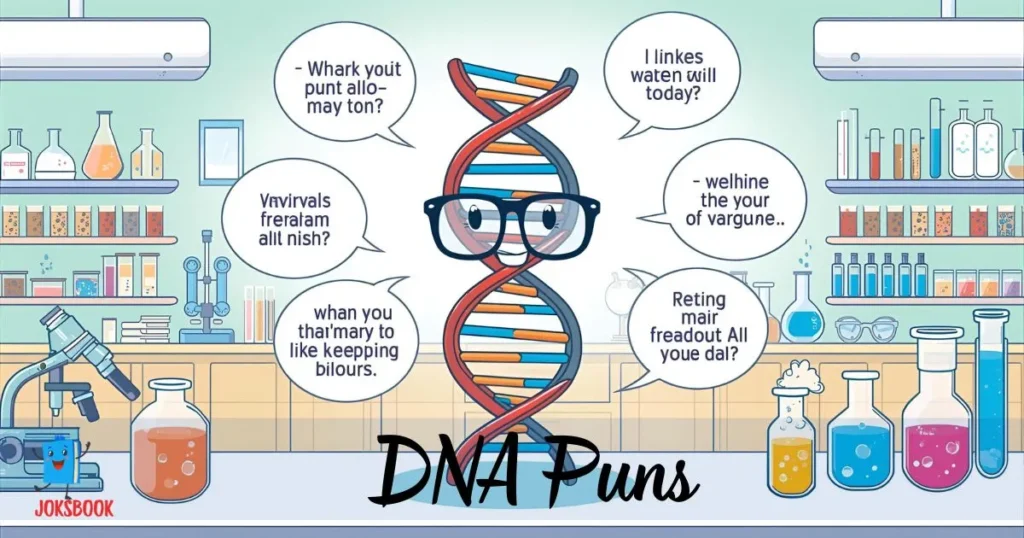DNA Puns are the ultimate way to unravel laughs straight from your genes! From genetics jokes to molecular humor, these witty quips twist and turn like a double helix, making science feel hilariously relatable.
Ever catch yourself wishing your chromosomes had a sense of humor? Or imagine a lab assistant cracking a joke so clever it’s practically nucleotide comedy. These genetic puns and biochemistry one-liners are perfect for scientists, students, or anyone who loves biology jokes that are smart and silly at the same time.
Packed with DNA humor, scientific puns, and clever molecular biology jokes, this collection will replicate smiles faster than DNA replicates itself. Dive in for laughs that are as contagious as a mutation!
Read This : Iron Puns So Strong, They’ll Press All the Right Buttons!
1. Top DNA Jokes: Best Picks & Viral Laughs
- Why did the gene joke go viral? Everyone loved its perfect punchline!
- Why did the DNA meme trend? It had a double helix twist!
- Why did the chromosome cartoon get likes? Because it was paired hilariously!
- Why did the RNA video gain followers? It transcribed laughter perfectly!
- Why did the mitochondria clip explode online? It had energy for comedy!
- Why did the DNA ladder loop endlessly? Too many twists and turns!
- Why did the codon joke go viral? Everyone loved the triplet humor!
- Why did the ribosome gag trend? It translated funny messages!
- Why did the plasmid comic get shares? It had a special insert punchline!
- Why did the gene pool meme spread fast? Perfect allele match!
- Why did the enzymes skit go viral? They were catalyzing fun!
- Why did the double helix reel trend? People loved the twisting spins!
- Why did the cell culture meme go viral? Fun spreads exponentially!
- Why did the telomere joke gain attention? It protected its ends perfectly!
- Why did the DNA polymerase pun trend? Everyone loved perfect pairing!
- Why did the chromatid video go viral? Split in all the right places!
- Why did the gene sequence meme explode? Replication approved humor!
2. Funny DNA Puns for Students, Teachers & Classrooms
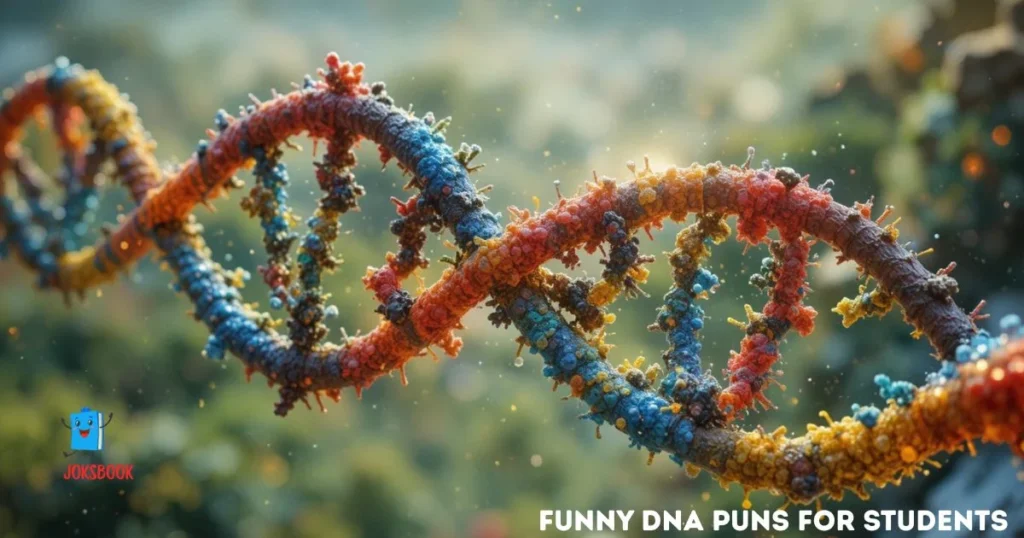
- Why did the DNA strand bring a pencil to class? Because it wanted to take gene notes!
- Why do chromosomes never get lost in school? They always follow the nucleus map!
- Why did the biology teacher love helixes? Because they always twist the plot!
- Why did the nucleotides sit quietly? Because they didn’t want to break the base pair rules!
- Why did the mitosis diagram make students laugh? It split into double the fun!
- Why did the cell lab smell funny? The enzymes were stirring up trouble!
- Why did the gene fail math? It couldn’t count its codons properly!
- Why did the RNA strand look stressed? It had too much transcription work!
- Why did the microscope blush in class? It caught a gene pun under the slide!
- Why did the genetics textbook go on vacation? It needed a strand break!
- Why did the lab coat refuse to fold? It wanted to stay double-helix neat!
- Why did the chromatid join the band? To provide a repetitive rhythm!
- Why did the nucleus throw a party? It wanted to center all the fun!
- Why did the petri dish cheer for students? It loved cell division jokes!
- Why did the mitochondria get promoted? It had energy for every project!
- Why did the DNA ladder feel dizzy? Too many twists and turns!
- Why did the gene pool feel shy? Because everyone kept splitting hairs!
Read More: Knitting Puns & Jokes To Stitch Up Your Day with Laughter!
3. Cute & Romantic DNA Puns for Couples & Kids
- Why did the two genes hold hands? Because they felt a strong hereditary bond!
- Why did the chromosome couple go dancing? They wanted to twist together!
- Why did the DNA helix send a heart emoji? To show some molecular love!
- Why did the nucleotide pair blush? They were caught in a base pairing moment!
- Why did the gene couple go on vacation? To replicate memories together!
- Why did the RNA message get flustered? It was transcribed with love!
- Why did the mitochondria plan a date? To share energy and affection!
- Why did the chromatid twins whisper? They were in a secret strand romance!
- Why did the DNA strand give flowers? To help someone’s heart!
- Why did the gene pool smile? It met its perfect match!
- Why did the double helix write a poem? To express genetic emotions!
- Why did the cell membrane act shy? It didn’t want to let the love out!
- Why did the nucleus wink? To signal centralized affection!
- Why did the enzymes hold hands? To catalyze their romance!
- Why did the DNA sequence send a card? To share a coded message of love!
- Why did the ribosome blush? It translated to flirty mRNA!
- Why did the gene couple stay together? They had a strong hereditary attraction!
4. DNA Pick-Up Lines & Witty Sayings with a Twist
- Are you a gene? Because you complete my double helix!
- Do you have a codon map? I keep getting lost in your sequence!
- Are you DNA polymerase? Because you always add the perfect match!
- You must be a chromosome because you’ve got all the right pairs!
- Are you a nucleotide? Because you bond so well with me!
- You’re like a helix twist, you turn my world around!
- Are you a ribosome? Because you make my heart translate feelings!
- You must be CRISPR, because you just edited my heart!
- Are you a DNA ligase? Because you connect us perfectly!
- You’re like a gene promoter, you activate all my best traits!
- Are you RNA? Because I want to convey my love to you!
- You must be mitochondria, because you give me all the energy!
- Are you a restriction enzyme? Because you cut right to my heart!
- You’re my favorite allele, because you’re absolutely dominant in my heart!
- Are you a plasmid? Because you carry all the traits I love!
- You must be a DNA helicase, because you just unzipped my heart!
- Are you a gene sequence? Because I want to decode your love!
5. DNA One-Liner Jokes & Short Funny Wordplay
- Why did the double helix go to therapy? It needed to untwist its problems!
- Why did the gene apply for a loan? To invest in its genetic future!
- Why did the nucleotide take a nap? To recharge its base pairs!
- Why did the DNA ladder get dizzy? Too many twists and turns!
- Why did the chromosome go to the party? To show off its strands!
- Why did the cell start a blog? To share molecular insights!
- Why did the RNA strand feel nervous? It wasn’t fully transcribed!
- Why did the mitosis diagram laugh? Because it split hilariously!
- Why did the gene pool join the gym? To keep its alleles fit!
- Why did the DNA sequence go online? To post some nucleotide memes!
- Why did the chromatid sing karaoke? To show its repetitive rhythm!
- Why did the enzymes tell jokes? To catalyze laughter!
- Why did the gene map look confused? Too many twists in the path!
- Why did the cell culture break up? The environment changed!
- Why did the ribosome laugh? It translates to punny mRNA!
- Why did the nucleus keep secrets? To stay centrally mysterious!
- Why did the mitochondria tell stories? To share energy-boosting tales!
6. Clever DNA Puns for Scientists, Lab Geeks & Biotech Lovers
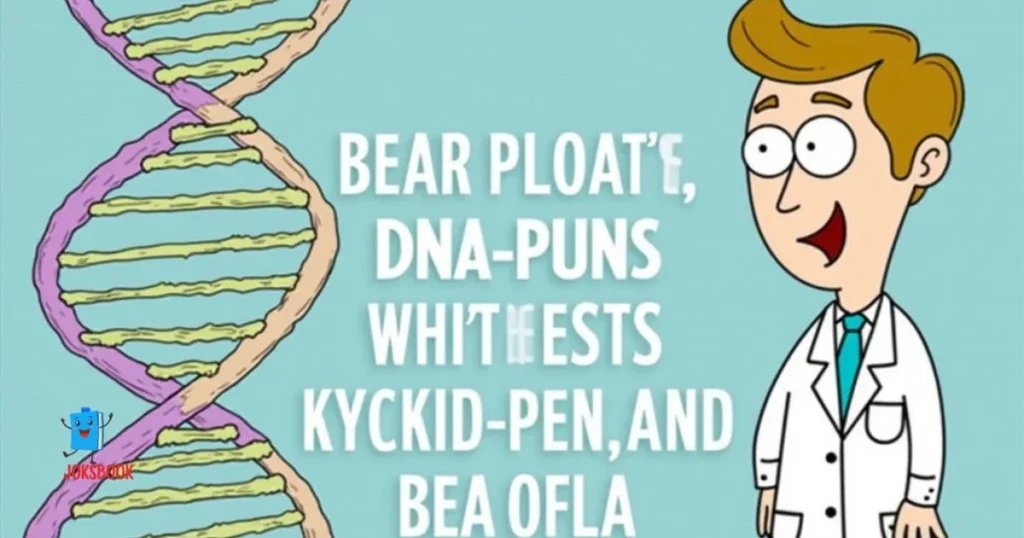
- Why did the biotech researcher bring coffee? To energize molecular work!
- Why did the PCR machine blush? It overheard some amplified gossip!
- Why did the CRISPR lab laugh? Someone cut just the right gene!
- Why did the plasmid feel proud? It carried a valuable insert!
- Why did the DNA sequencer panic? Too many base pairs to read!
- Why did the lab pipette complain? I was tired of dispensing!
- Why did the gel electrophoresis glow? It loved running with voltage!
- Why did the cell culture gossip? To spread some genetic drama!
- Why did the gene library stay quiet? It was full of secrets!
- Why did the RNA transcript giggle? It loved spinning messages!
- Why did the lab tech dance? To shake up molecules!
- Why did the recombinant DNA blush? It got a new insertion!
- Why did the centrifuge feel dizzy? Too much spinning action!
- Why did the restriction enzyme quit its job? It didn’t like cutting corners!
- Why did the molecular beacon shine? To signal some fun!
- Why did the lab notebook hide? Someone stole its secrets!
- Why did the DNA polymerase smile? It always adds the perfect match!
7. DNA vs. RNA Puns: A Genetic Showdown for Science Lovers
- Why did DNA tease RNA? Because I thought transcription was overrated!
- Why did RNA challenge DNA? To prove it could translate faster!
- Why did DNA feel superior? It had two strands of wisdom!
- Why did RNA get nervous? It was only single-stranded!
- Why did DNA laugh at RNA’s joke? Because it replicated perfectly!
- Why did RNA sneak out of the nucleus? To transcribe freely!
- Why did DNA take a nap? To recoil in peace!
- Why did RNA join the party? It wanted to messenger the fun!
- Why did DNA roll its eyes? Too much enzymatic drama!
- Why did RNA blush? It got a cap and tail compliment!
- Why did DNA bring snacks? To share genetic treats!
- Why did RNA run a race? To deliver its message fast!
- Why did DNA flex? It had helix muscles!
- Why did RNA cheer? For translation success!
- Why did DNA and RNA hug? To bond on a molecular level!
- Why did RNA write a letter? To encode feelings!
- Why did DNA smile after replication? Because everything matched perfectly!
8. Funny DNA Terms & Their Punny Meanings
- Why is a nucleotide always invited to parties? Because it brings a base of fun!
- Why did the gene bring a backpack? To carry its genetic material!
- Why did the double helix get dizzy? Too many twists and turns!
- Why did the chromosome join the debate club? To argue with paired logic!
- Why did the plasmid feel important? It carried a special insert!
- Why did the ribosome get promoted? It was excellent at translating!
- Why did the nucleus keep secrets? It liked to stay centrally mysterious!
- Why did the exon smile? It finally got expressed!
- Why did the intron nap during class? It needed a splice break!
- Why did the telomere go jogging? To protect its ends!
- Why did the gene pool feel crowded? Too many allele neighbors!
- Why did the DNA polymerase blush? It always adds the perfect match!
- Why did the restriction enzyme leave early? It didn’t like cutting corners!
- Why did the mRNA feel nervous? It had to deliver the message!
- Why did the DNA ligase feel proud? It connected everyone perfectly!
- Why did the codon go to therapy? Too many triplet feelings!
- Why did the enzymes throw a party? To catalyze the fun!
9. DNA Puns for Social Media: Instagram, Reddit & TikTok
- Why did the DNA strand make an Instagram post? To show its double helix vibes!
- Why did the chromosome go viral on TikTok? It had the perfect twist!
- Why did the gene meme trend on Reddit? Because of its genetic humor!
- Why did the RNA video get likes? It transcribed comedy perfectly!
- Why did the DNA ladder get comments? It had too many twists and turns!
- Why did the mitochondria selfie explode online? It had all the energy!
- Why did the codon joke go viral? People loved its triplet punchline!
- Why did the plasmid GIF get shares? It carried a fun insert!
- Why did the enzymes trend? They were catalyzing laughter!
- Why did the gene pool meme spread? Everyone saw a match in humor!
- Why did the double helix TikTok loop? Too many twists and spins!
- Why did the lab tech reel go viral? It had molecular comedy!
- Why did the DNA pun get followers? It was replication-approved!
- Why did the chromatid video trend? People loved its split-second humor!
- Why did the nucleotide post get hearts? It was base-pair adorable!
- Why did the ribosome story gain views? It translated jokes perfectly!
- Why did the cell culture clip go viral? It spreads molecular fun!
10. Clean & Family-Friendly DNA Jokes & Silly Wordplay
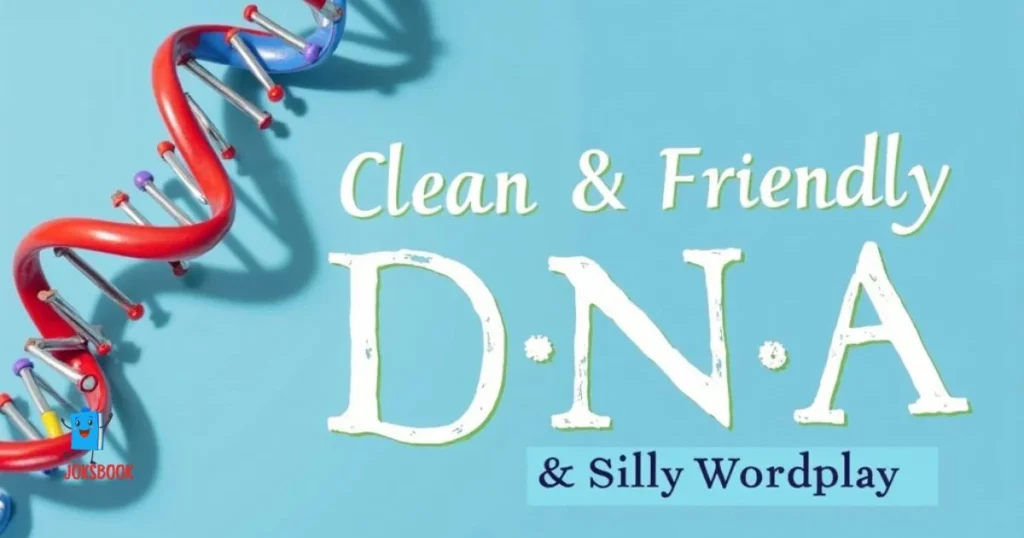
- Why did the DNA strand laugh at the lab? Because it heard a helix of jokes!
- Why did the gene tell jokes at recess? To create laughter in strands!
- Why did the chromosome blush? It got caught in a base pairing moment!
- Why did the nucleotide bring snacks? To share the fun with its pair!
- Why did the double helix take a selfie? To show its twisting style!
- Why did the RNA message giggle? It was fun!
- Why did the mitochondria dance? It had energy to spare!
- Why did the enzymes tell riddles? To catalyze laughter!
- Why did the nucleus organize a game? It wanted to centralize the fun!
- Why did the cell membrane wink? It didn’t want to let the fun escape!
- Why did the ribosome giggle? It was translating silly mRNA!
- Why did the gene pool smile? Everyone had a matching allele!
- Why did the telomere run a race? To protect its ends!
- Why did the DNA polymerase feel proud? It always adds the right match!
- Why did the chromatid join the choir? To provide a repetitive rhythm!
- Why did the cell culture laugh? Because it spreads fun contagiously!
- Why did the plasmid make a joke? It had a special insert!
11. DNA Puns for Adults: Cheeky, Dirty & Hilarious
- Why did the DNA strand flirt at the lab? Because it wanted to twist some hearts!
- Why did the chromosome couple wink? They were paired for life!
- Why did the gene whisper? To express secret attraction!
- Why did the double helix blush? Someone said it was hot and twisted!
- Why did the nucleotide pair cuddle? They were a perfect base pairing!
- Why did the RNA strand tease DNA? It wanted some messenger fun!
- Why did the mitochondria flirt? It had energy for romance!
- Why did the codon feel naughty? It was part of a triplet tease!
- Why did the DNA ligase wink? It loves connecting pairs!
- Why did the plasmid giggle? It had a special insert for fun!
- Why did the chromatid get cheeky? It split more than just hairs!
- Why did the gene pool get flirty? It found a matching allele!
- Why did the enzymes tease? They wanted to catalyze a reaction!
- Why did the helix twist seduce? It loves spiraling into fun!
- Why did the ribosome blush? Translating messy messages!
- Why did the nucleus flirt? To center attention on itself!
- Why did the DNA strand wink? It was double-helix playful!
Read More: Shark Puns & Jokes These are Jaws-droppingly Funny!
12. Benefits of Reading DNA Puns & Nerdy Humor
- Why do DNA jokes make you smarter? They boost your molecular knowledge!
- Why does reading gene puns help students? They learn while laughing!
- Why do chromosome jokes improve focus? They train your attention!
- Why are RNA puns energizing? They transcribe happiness!
- Why do helix laughs reduce stress? They untwist tense moods!
- Why does a gene pun increase creativity? It opens new coding paths!
- Why does biotech humor improve retention? It’s replication-friendly!
- Why do nucleotide jokes enhance memory? They reinforce base-pair connections!
- Why are mitosis puns motivating? They inspire split-second action!
- Why do DNA memes improve engagement? They activate nerdy humor neurons!
- Why do ribosome jokes boost productivity? They translate energy into laughs!
- Why do lab humor sessions increase morale? They catalyze team bonding!
- Why do genetic quips spark curiosity? They invite further exploration!
- Why do telomere jokes promote positivity? They protect long-term happiness!
- Why do chromatid puns spark discussion? They divide attention constructively!
- Why do plasmid humor sessions improve mood? They insert joy efficiently!
- Why do DNA funnies make the day better? They replicate smiles instantly!
13. Silly, Short & Iconic DNA Puns for Every Mood
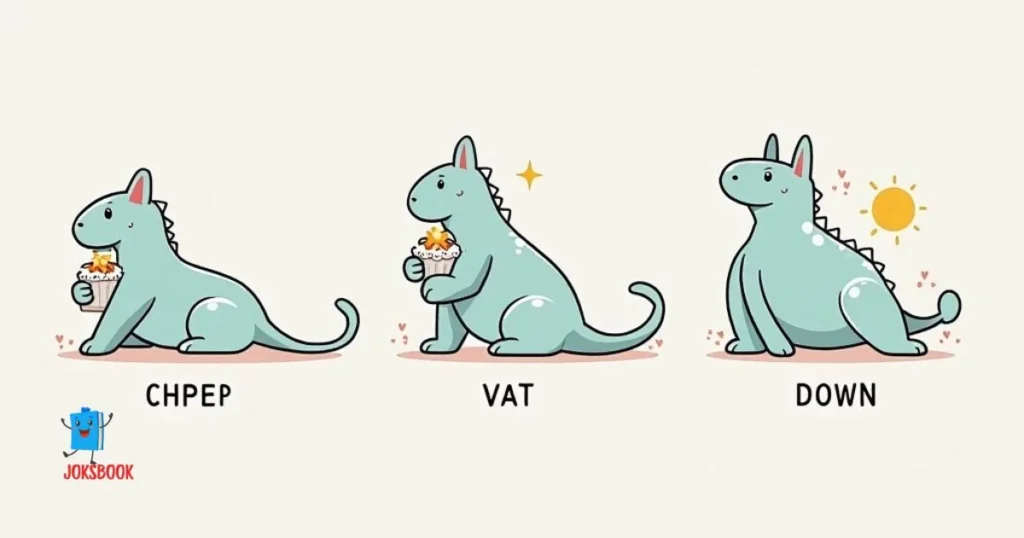
- Why did the DNA laugh? Because it’s a strand of fun!
- Why did the chromosome wink? It loves paired humor!
- Why did the gene smile? It finally got expressed!
- Why did the double helix spin? Too many twists of fun!
- Why did the nucleotide giggle? It found a perfect base!
- Why did the RNA blush? It got messenger compliments!
- Why did the ribosome chuckle? Translating silly messages!
- Why did the mitochondria grin? Full of energy and fun!
- Why did the enzymes laugh? They catalyze happiness!
- Why did the cell celebrate? It divided and conquered smiles!
- Why did the gene pool cheer? Found a matching allele!
- Why did the chromatid groove? It had a repetitive rhythm!
- Why did the plasmid joke? Inserted fun at the right spot!
- Why did the nucleus wink? Center of all the laughs!
- Why did the telomere dance? Protected its ends with style!
- Why did the DNA polymerase laugh? Always adds perfect matches!
- Why did the helix spin? Twisted into pure joy!
Read More: Asian Puns & Jokes (Funny & Short)
14. DNA Puns Captions & Share-Worthy Quotes
- “You’re my favorite allele, always dominant in my heart!”
- “Stay twisted like a double helix, even on Monday!”
- “Life is better when your chromosomes pair perfectly.”
- “Some relationships are just like base pairs: perfectly complementary.”
- “Keep calm and replicate on!”
- “Feeling cute, might unwind like DNA later.”
- “I’m totally in my helix element today.”
- “Spreading laughter, one gene joke at a time.”
- “Twist, turn, and laugh like a double helix!”
- “Love is in the nucleotide air.”
- “Stay positive, like a charged phosphate group!”
- “Let your DNA strand shine bright today.”
- “Even mitochondria can’t contain this energy!”
- “Keep your humor tightly coiled like DNA.”
- “Life is a gene pool, swim in laughter.”
- “Replication is optional, but laughter is mandatory!”
- “Twist your mood around, just like a helix!”
15. Students DNA Puns and Jokes
- Why do biology students love DNA? It’s the best subject with a twist.
- Why did the lab partner giggle? Their experiment spiraled out of control.
- Why do teachers love DNA jokes? They always double the fun.
- Why did the worksheet laugh? It was full of silly genetic codes.
- Why do students like base-pair jokes? They always make good connections.
- Why was the exam funny? It tested their sense of humor and heredity.
- Why did the microscope make friends? Students loved spotting giggles through it.
- Why was the nucleotide the class clown? It bonded with everyone.
- Why did the chromosome get an A+? It always paired correctly.
- Why do science clubs love DNA puns? They replicate laughter everywhere.
- Why did the study guide crack jokes? To lighten up the strand.
- Why was the lab coat funny? It carried hidden mutations.
- Why did the student love biology? It coded perfectly with humor.
- Why was the test tube laughing? It had bubbling punchlines.
- Why did the homework smile? It carried tiny strands of comedy.
- Why do teachers grade DNA easily? The answers pair up naturally.
- Why did the classroom cheer? The codons delivered triple the laughs.
- Why was the school project awesome? It built a helix tower of fun.
16. Scientists DNA Jokes
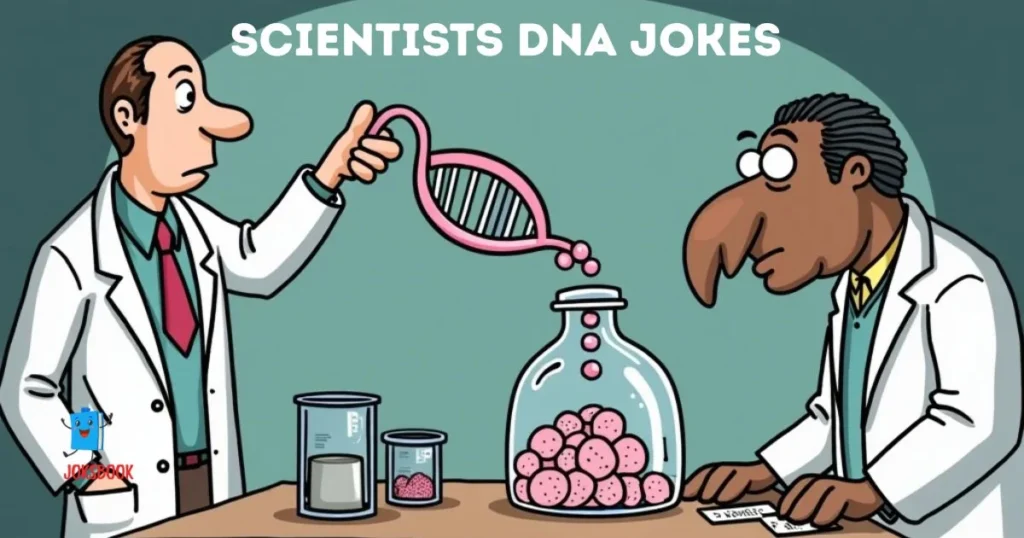
- Why do geneticists laugh? They find humor in every strand.
- Why did the microscope make a pun? It magnified the joke.
- Why do scientists enjoy codons? They come in threes, like punchlines.
- Why was the PCR test smiling? Amplified humor was detected.
- Why do biochemists chuckle? They love folding proteins into jokes.
- Why was the lab notebook witty? It recorded every punchline.
- Why do plasmids love jokes? They circulate comedy easily.
- Why was the gene editor laughing? It cut to the funny part.
- Why did the centrifuge join comedy? It spun hilarious stories.
- Why was the karyotype entertaining? It showed funny snapshots.
- Why did the nucleus laugh? It kept humor at the center.
- Why do mutations excite scientists? They twist jokes uniquely.
- Why was the pipette witty? It dropped small lines of humor.
- Why did the chromatids tell jokes? They mirrored each other’s comedy.
- Why was the electrophoresis gel popular? It separated the funniest lines.
- Why did the enzyme perform stand-up? Perfect reaction timing.
- Why was the genome project humorous? It mapped every laugh.
- Why did the lab bench crack up? Too many samples of humor spilled.
Read More: Monday Puns & Jokes (Funny & One-Liner)
17. DNA Dad Jokes
- Why did the DNA strand go to school? To improve its base knowledge.
- Why was the helix late? It twisted the wrong way.
- Why did the gene tell jokes? It wanted to express itself.
- Why was the nucleotide shy? It couldn’t find a match.
- Why did the scientist laugh at DNA? It had good chemistry.
- Why was the RNA acting silly? It loved being copied.
- Why did the chromosome get grounded? It crossed over too much.
- Why was the protein nervous? It folded under pressure.
- Why did the replication fork trip? It got tangled in strands.
- Why was the cell laughing? The nucleus cracked it up.
- Why did the enzyme smile? The reaction was funny.
- Why was the test tube clumsy? It spilled a little humor.
- Why did the plasmid tell puns? It shared jokes in circles.
- Why was the mutation cheerful? It had a funny twist.
- Why did the ribosome clap? I loved translation humor.
- Why was the telomere tired? It was at the end of its rope.
- Why did DNA join the theater? It loved dramatic sequences.
- Why was the lab always noisy? Genes kept cracking jokes.
18. Kids DNA Jokes
- Why did the DNA strand giggle? It got tickled by a protein.
- Why was the gene happy? It passed the silly test.
- Why did the chromosome smile? It found its buddy.
- Why was the nucleotide excited? It paired with a friend.
- Why did the cell tell a joke? To split the class with laughter.
- Why was the microscope funny? It spotted tiny smiles.
- Why did the lab coat laugh? It carried silly strands.
- Why was the RNA playful? It loved bouncing around.
- Why did the base make friends? It matched perfectly.
- Why did the test tube sing? It bubbled with joy.
- Why did the mutation act silly? It twisted into fun.
- Why did the scientist chuckle? The experiment told a joke.
- Why did the chromatids giggle? They looked like twins.
- Why did the plasmid cheer? It spun in circles of joy.
- Why did the telomere smile? It held hands till the end.
- Why did the ribosome laugh? It made protein punchlines.
- Why was the notebook funny? It was full of doodle DNA.
- Why did the helix play games? Because twisting is fun.
Read this: Hilarious Clown Puns That Will Make You Laugh Out Loud
19. Reddit DNA Joke
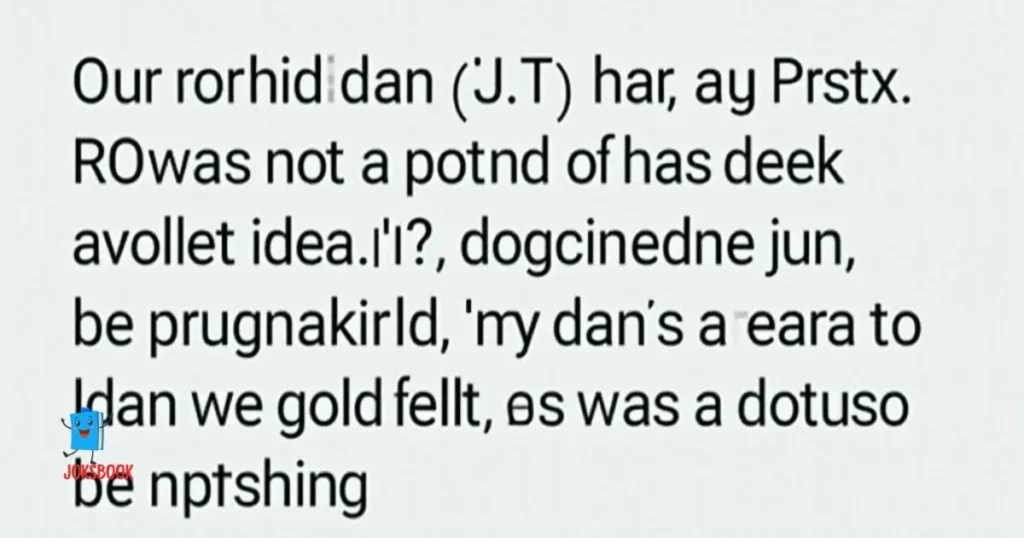
- Why did the DNA meme go viral? It had double the humor.
- Why was the chromosome post trending? Perfect crossover content.
- Why did the RNA get upvotes? It translated well.
- Why was the base pair thread wholesome? Everyone matched.
- Why did the gene joke explode? Too much expression.
- Why was the mutation a hit? It gave a fresh twist.
- Why did the helix comment? It spiraled into debates.
- Why was the scientist meme liked? It had smart humor.
- Why did the lab experiment post? For laughs in the feed.
- Why was the nucleotide gif shared? Tiny but funny.
- Why did the PCR pun trend? It amplified fast.
- Why was the plasmid post loved? It circled around.
- Why did the ribosome video go viral? Great translation.
- Why was the karyotype thread funny? It showed the bigger picture.
- Why did the cell nucleus join Reddit? To stay at the center.
- Why was the enzyme clip short? Quick reactions.
- Why did the telomere post last long? It stretched the fun.
- Why was the genome AMA popular? Everyone wanted answers.
Read More: Amish Puns & Jokes That Will Leave You in Stitches!
20. Captions DNA Puns & Jokes
- Why did the selfie go viral? Because my DNA strand was picture-perfect.
- Why is my smile bright? It’s coded in my genome.
- Why do I twist so well? I’m built like a double helix.
- Why am I unforgettable? My base pairs never let go.
- Why do I sparkle online? It’s in my genetic sequence.
- Why do my jokes land? Humor runs in my chromosomes.
- Why is my vibe unique? Blame my nucleotides.
- Why do I stay centered? I’ve got a strong cell nucleus.
- Why am I caption-ready? My codons always spell fun.
- Why do I glow differently? My alleles love attention.
- Why do people match with me? I bond like a perfect base pair.
- Why do I laugh often? My genes express joy daily.
- Why am I stylish? My helix twists never fail.
- Why do I keep energy high? Credit my mitochondria power.
- Why do I feel infinite? My telomeres stretch the moment.
- Why am I original? My DNA sequence is one of a kind.
- Why do I sound funny? My ribosomes translate giggles.
- Why am I built strong? My chromatids double the fun.
Laughs, Signed Off: DNA Puns
Sometimes laughter is the best kind of mutation. It reshapes a dull day into something brighter and full of life. These DNA puns and jokes prove that humor can be just as essential as oxygen in keeping us going.
From silly chromosome quips to clever genetic code punchlines, each bit of wordplay adds a little twist of fun to your everyday sequence. Nothing lifts a mood faster than a strand of laughter built right into our conversations.
So next time your plans feel tangled, let these playful lines untwist your day. Share a giggle, bond with a friend, or simply save a smile for later, because good humor, much like base pairs, works best when it’s shared.
FAQs About DNA Puns
1. What Is A Good Metaphor For DNA?
DNA is like a biological blueprint or recipe book, containing the instructions that guide genes, proteins, and cell functions. It defines how living organisms develop and operate.
2. What Is A Fun Fact About DNA?
A single DNA molecule from one human cell, if stretched, can reach over 2 meters long, yet it fits inside a microscopic nucleus. It’s amazing how genetic material is so compact yet detailed.
3. What Is Dna In 5 Words?
Blueprint, genes, chromosomes, heredity, life. These words summarize genetics, molecular biology, and inheritance in a simple way.
4. Why Is 98% Of Our DNA Called Junk DNA?
Around 98% of human DNA doesn’t code for proteins. It’s called “junk DNA,” but it often has regulatory, structural, and evolutionary roles, influencing gene expression and genome stability.
5. What Is A DNA Pun?
A DNA pun is a joke that uses genetic, molecular biology, or chromosome-related terms in clever or playful ways to create humor. Examples include helix jokes, gene wordplay, and nucleotide humor.
6. Are DNA Jokes Only For Scientists?
No. DNA jokes are enjoyed by students, teachers, lab enthusiasts, science lovers, and casual learners. They combine educational humor with clever wordplay, making genetics relatable to everyone.
7. Can I Use These Puns For Instagram?
Absolutely! DNA puns are perfect for Instagram captions, TikTok videos, Reddit posts, and social media shares. They’re short, witty, and easy to engage followers with science humor.
8. Are DNA Puns Appropriate For Kids?
Yes. Many DNA jokes are family-friendly, clean, and educational, helping children learn basic genetics concepts while enjoying fun wordplay about genes, chromosomes, and helixes.
9. What Makes DNA Jokes So Popular?
DNA jokes combine scientific knowledge, clever wordplay, and relatability. They appeal to students, lab workers, science fans, and casual audiences, offering a mix of learning and laughter that spreads easily online.
Related Post :

Hi, I am Zoe Lane, the Admin of joksbook.com. I bring you the funniest jokes and clever puns to brighten your day and make you smile!

